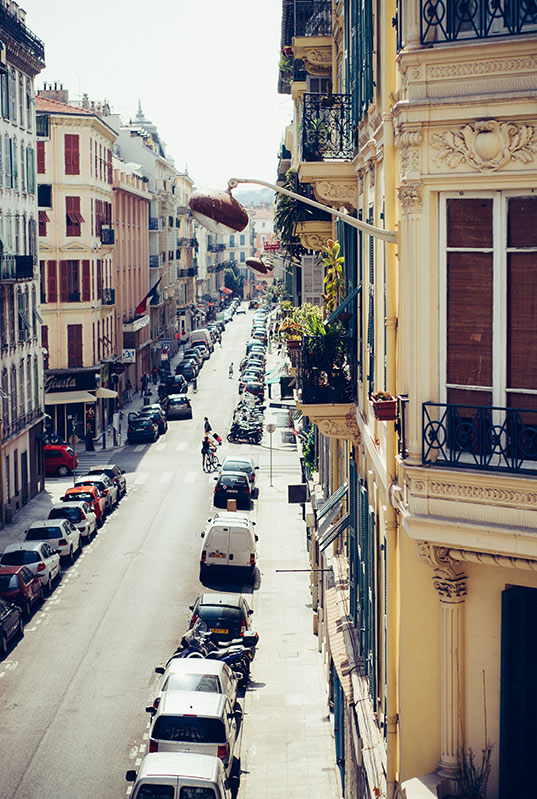Your guide to purchase a home in France
The purchase process for a French property, house and owner-occupied apartment, consists of two parts, the preliminary agreement, "Compromis de Vente" and the agreement to complete the actual purchase at the notary, "Acte de Vente".


Step 1: Preliminary purchase agreement, "Compromis de Vente"
Once a price has been agreed with the seller, both parties will sign a preliminary purchase agreement that is legally binding both seller and buyer. The preliminary purchase agreement is called "Sous-seing Privé" if it is drawn up by a French broker, or "Compromis de Vente" if it is drawn up by a French notary. The buyer usually pays a deposit of between 5% - 10% of the purchase price. This deposit remains "blocked" in a special account in the notary's name until the purchase is completed or the purchase is canceled. At this stage, the property is removed from the market.
Inspection of the property's condition by professional inspectors is unusual in France. It is more common for local craftsmen to give an idea of the condition and then to give quotes on required repairs. It is advisable to carry out all inspections and investigative work before signing the "Compromis de Vente", as once this agreement has been drawn up and signed, it is legally binding on both parties and it is too late to introduce additional clauses and price adjustments.
Once the "Compromis de Vente" has been signed, a period of 6-8 weeks follows when investigations are made by the notary to ensure that the property is not subject to changes in the local environment, that no unknown mortgage is charged to the property and at the same time the buyer must resolve the financing of the purchase.
Unlike most European lawyers, the notary is not appointed to represent either of the parties to the transaction, but as a public official, whose task is to ensure that state laws and regulations are complied with, i.e. to ensure that the transaction is carried out legally and correctly.
Consequently, it may be a good idea to appoint a second notary who acts on behalf of the buyer and you may feel more "comfortable" having your own notary or lawyer to explain some of the points that arise that may be unclear.
If the buyer intends to take a mortgage on the property, it is necessary that this is declared at the time of the agreement and a provision in "Compromis de Vente" protects the buyer's interests in the event that a mortgage is not made available. In this case, the sale can not proceed and the deposit is returned.
Upon discovery of a "planned inconvenience" through the searches, the buyer can withdraw his deposit.
However, should the buyer break the contract, the deposit is paid to the seller as compensation and vice versa if the seller breaks the contract, the deposit is returned to the buyer.
Step 2: Final agreement, "Acte de Vente"
Before the 6-8 weeks have expired, the period can be extended by agreement between the parties. The final agreement "Acte de Vente" is signed at the notary's office and the property is then transferred to the buyer. The buyer must understand what he or she reads and what he or she signs under French law, “lu et apprové”. If the buyer does not understand, the buyer must have an assistant who is fluent in the French language. The buyer must pay the balance of the purchase price plus all fees to the notary's account, which then pays the seller. It should be noted that the balance must be received by the notary before the "Acte de Vente" is signed. After signing the "Acte de Vente", the buyer is responsible for all renovation works on the property and insurance should be taken out from this date. The buyer must provide the notary with a copy of his birth certificate translated into French and, where applicable, a copy of the marriage certificate translated into French before signing the 'Acte de Vente'.


Costs of purchase
The buyer pays notary fees (between 3% - 4%) and transfer tax (4.86%), which amounts to a total of about 7-8% of the purchase price plus any geometry costs that may have arisen, such as establishing plot boundaries, moving plot boundaries and preparing plans for "Acte de Vente". These fees are paid to the notary before the signing of the "Acte de Vente" and are paid together with the rest of the purchase price. These fees in French are called "pour frais d'acte d'achat", which means preliminary estimated fees in order to complete the purchase. These preliminary fees are documented in the original purchase agreement and include an estimate of the registration fees, which are paid to the notary's account.
A few months after the property has been purchased and the sale has been submitted to the French state, the exact registration tax will be calculated by the French tax authorities. Depending on the original estimate (whether it was an overdraft or an underdrawal), the buyer will get back or have to pay more money. If you take out a mortgage through a French financial institution, additional costs will be added for the registration cost of a mortgage on the property and subscription to the property register.
Costs when buying new construction
A buyer who buys a new property must make regular installments after each completed phase of construction with an initial deposit of 5% to 10%. The initial deposit and regular installments vary. Total overhead costs, notary fees, for new construction are significantly less (about 4%) than the ones associated with buying an old property in France, about 7 - 8%.
Tax on the sale
If the property is your primary residence, you are exempt from capital gains tax on sale. The simple rule is that you must be a resident of the property at the time of the sale, which means when the preliminary contract, "Compromis de vente" is signed. Once a sale has taken place, it is possible to leave the property and move elsewhere before the sale of the French property is complete as long as the delay is not "unreasonable" in time.
If the property is not your primary residence when you sell it, a tax of 35.5% is currently paid on the capital gain, the difference between the purchase price and the sale price. If you are resident outside France, you must prove your place of residence at the time of the sale in the form of a certificate from the tax authority of your home country, in order to avoid an even higher tax for non-EU citizens.
Deductions may be made for costs incurred in connection with the purchase as notary fees. You can also deduct for costs in connection with the sale, such as costs for inspection. Also deductions for costs for work such as new, remodeling, extensions or improving renovations that have meant a higher standard.
The cost of renovating an existing bathroom or kitchen must not be included. The French tax authorities will only accept deductions for invoices with VAT from a French registered builder and proof of paid invoice, usually in the form of an account statement. After deductions, the capital gain is then reduced by 2% per year after the fifth year of ownership until the 17th year of ownership and thereafter by 4% per year from the 18th year of ownership to the 25th year of ownership and by 8% per year from the 26th year of ownership until the 30th year of ownership. Which means that after 30 years of ownership, there is no capital gain left as a tax base.